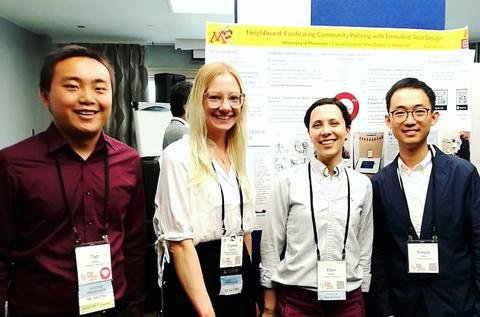CS&E undergrads present at ACM’s CHI Student Design Competition

Two teams of undergraduate students traveled to Glasgow, Scotland to present their research at ACM’s CHI Student Design Competition.
The teams presented work in the field of Human-Computer Interaction (HCI). Tab and Yongle Zhang presented on their proposed system called HelloBox, which, through the use of an app, RFID tags, and check-in stations, lets parents know where their children are at all times without having to impede their independence. Crystal Compton and Ellen Dupler presented NeighBoard, a community policing technology that helps communities create their own strategies for preventing crimes and maintaining the safety of their neighborhoods.
The trip and conference were a first for all the students and proved to be an enlightening and productive experience.
“I was so glad to share our project with the academic community,” said Yongle. “I had the chance to talk with a lot of wonderful researchers and attend many interesting paper sessions at the frontier of HCI.”
Being among a community of like-minded professionals inspired these up and coming researchers on different ways to approach design problems.
“It was rewarding to see other attendee’s passion of investigating and improving human-computer interaction,” Ellen said. “The conference showcased the breadth of the field—from electrospun polymer textile, anchoring effects in usability studies, pictorial SUS scales, to a barometric touch sensor.”
For Crystal, a highlight was getting a chance to meet other future professionals in the area, saying that it was “particularly useful to meet and network with other individuals about my personal research in order to strengthen, expand, and improve upon it.”
The generous support of our IAC member companies and UROP grant funding made this trip possible for our students. Thank you to them and congratulations to the HelloBox and NeighBoard design teams.
HelloBox: Creating safer and kid-friendly communities
Children’s ability to walk to school or play around their neighborhoods without parental supervision has severely declined in the past decade. Loss of local activities and mobility may leave children prepared for transitions to adulthood and make them less independent and may have negative health effects. In this paper, we discuss the findings of our research on children’s unsupervised play in their neighborhoods. We propose HelloBox, a system including an app, wearable RFID tags, and check-in stations to keep track of children when they are outside without an adult. HelloBox lets parents know where their children are without restricting their independence and builds community between local families. The project focuses on improving children’s independent mobility and encouraging social interactions between families within neighborhoods.
Full paper
NeighBoard: Facilitating Community Policing with Embodied Tech Design
Augmenting grassroots community policing (CP) efforts with technologies that assist citizens is a promising strategy for reducing real and perceived fear of crime. We used a human-centered design approach, working with residents of the St. Paul Summit-University neighborhood, to discern abstract functionalities for developing new CP technology. We then created and evaluated NeighBoard, which aims to enhance the social fabric of communities by letting citizens implement their own strategies for preventing crime and maintaining safety in their neighborhood.
Full paper
Supplemental video